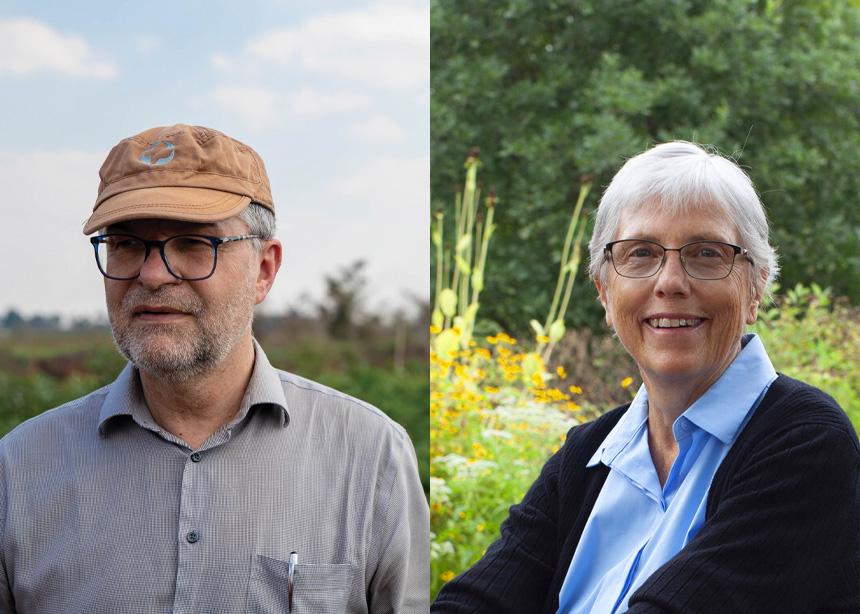The following opinion piece is an additional response by Mennonite Central Committee (MCC) to serious concerns raised in our “Involuntary” article (July 2024) as well as in the online petition and open letter referenced in that article and posted online by a group of seven former MCC workers. – Eds.
As the executive directors of Mennonite Central Committee (MCC) Canada and MCC U.S., we want you to know that we are listening to the concerns recently raised by alumni, staff and others, and are holding them with humility and compassion. We are practicing prayerful discernment that will allow us to work with wisdom and grace toward resolution and healing.
MCC is an organization made up of people of faith, committed to sharing God’s love and compassion with all in the name of Christ. We seek to build an internal culture that reflects our faith and mission. We want to learn where MCC can, and must, make some important changes.
As we have read and reviewed the materials online, we know MCC can do better in our ongoing work. In the past decades, we have grown more complex in our efforts to meet urgent needs and work for peace and justice, all in an ever-changing world reeling under the weight of war, conflict and heart-wrenching disaster.
We acknowledge that our processes and systems have not always kept pace with our own growth and the increasing complexities of service across 40 countries. Even before the online petition and open letter were posted, MCC had identified three areas that need attention:
MCC will continue to expand our Human Resources (HR) capacity as part of what it means to be a faith-based organization living out our values and ensuring we meet legal requirements and best practices. We recognize the growing needs of the organization, especially internationally. We are committed to moving more fully toward racial equity and inclusion; we are building processes to ensure that every MCC worker is treated equitably and fairly. We are strengthening our reporting and safeguarding requirements; increasing training around anti-bias and safety; and improving worker care.
MCC will continue to explore ways to integrate additional restorative justice principles into our HR processes, including terminations.
MCC will conduct a deeper review of our policies around conflict, harassment, grievance and abuse of power. We want to ensure that our services and responses around reporting, such as how we conduct case management, are stream- lined and easier to engage. This includes a review of the Speak Up Service, which was launched in spring 2023.
People have asked why we haven’t replied to concerns on social media. Please do not interpret our online silence to mean we do not care or want to engage. When it comes to social media, there are legal limits to what an employer can say, particularly when there is active litigation. No matter how strong the calls, we do not believe it is right or appropriate for MCC to engage in public discussions related to confidential personnel matters.
Yes, there is work to be done. We also believe there is a difference between workplace abuse and organizational conflict. Individuals citing organizational abuse may not have all the facts and can easily make assumptions without all the evidence. Conflict, by nature, is multifaceted and includes more than one perspective.
We do want you to know that, when employee transitions occur, MCC does not, as a matter of practice, use non-disclosure agreements (NDAs) or non-disparagement clauses. In almost all cases, these types of agreements are unnecessary. In the rare occasion when there is potential for a lawsuit, our legal counsel provides us with templated agreements in which both sides agree to not pursue further litigation or disparage the other side.
MCC does engage mediators or legal counsel to reach a settlement when disagreements cannot be resolved through shared problem-solving.
When MCC staff who serve outside their home countries complete their terms, or if they separate early from MCC, it’s common practice for MCC to provide a financial amount to help them transition back to their home country. This is a monetary amount offered with care, compassion and generosity. We want to help them re-establish themselves in new settings.
Having placed thousands of people of all ages in often difficult and complex situations, MCC has a good overall track record for success. MCC’s annual turnover rate is 14 percent, which is below the U.S. nonprofit national average of 19 percent (based upon 2022 data).
MCC cares about its workforce. We invest deeply in preparing workers as they enter a new context. We engage in vigorous and ongoing support throughout a worker’s service term.
Risk and uncertainty are inherent to MCC’s work. In the challenging and changing locations in which we serve, nothing any organization or individual can do will guarantee that an assignment, context or country is or will remain the right fit for a particular person or family. In some cases, there will be situations in which staff disagree with decisions made by supervisors or leaders—especially when staff are working in contexts of volatility or crisis. Our goal is to work through disagreements in a fashion that respects all individuals involved.
Yes, there is work to be done. As an organization, MCC is composed of imperfect people trying to do difficult and compassionate work. We must listen. We must learn. We must do better. We will continue to seek healing and resolution with those who have experienced situations where MCC has not lived up to our values and mission.
At the same time, our commitment to the mission of sharing God’s love and compassion for all in the name of Christ will not waver. Thank you for your continued prayers and ongoing support as we walk this journey together.
Ann Graber Hershberger is executive director for MCC U.S., and Rick Cober Bauman is executive director for MCC Canada. For more, see mcc.org/our-stories/journey-service-mennonite-central-committee.



Comments
Yes, there is a difference between abuse and conflict. Conflict is a human constant; every organization has conflict. Abuse can happen in the context of conflict, particularly when the conflict is poorly understood and power imbalances are ignored.
The authors of the open letter named their experiences as abuse, based on established understandings of that term.
At this point, there are literally dozens of people alleging some experience of abusive treatment during their time working for MCC. They use the term "abuse" because it is the most accurate term for the things they report having experienced and had reported to them. As of this writing, those reports encompass many forms of abuse, including sexual abuse.
I think these execs are trying to make readers (and donors) suspect that the writers of the open letter are overreacting, overstating the case, and/or providing information that is not to be fully trusted.
All abuse allegations are complicated. It's part of the nature of abuse that it's hard to describe succinctly. This kind of bothsideism in the face of abuse allegations is a way of vaguely casting doubt on people who do not have institutional power. But you don't have to fully understand everything going on to recognize a pattern when it's staring you in the face.
We've all seen what happens when leaders refuse to entertain the possibility that they have systemic problems with abuse, and I think that's what happening here, despite all the posturing. It doesn't end well for anyone. MCC deserves better.
I have rarely read a letter that disappointed or saddened me as much as this one. Seven individuals who committed years of their life to the work of MCC, wrote an open letter talking about their suffering, their pain and their trauma. They were courageous enough to be vulnerable and cite specific examples from their experiences, and this letter of response does not even acknowledge their pain or express sorrow and compassion for their ongoing suffering. MCC is an arm of the church. If we as church cannot show compassion for those who we hurt, we are guilty of trying to take the specks out of others’ eyes while ignoring the log in our own.
To the authors of the open letter, I am sorry that we as the larger church have not been there when you needed support, compassion and understanding.
From the begining to the end of this letter, I have read this letter with my keen sensitivity to find and recognize any word starting with sincere "a" (apology). None. Very disappointing!
Add new comment
Canadian Mennonite invites comments and encourages constructive discussion about our content. Actual full names (first and last) are required. Comments are moderated and may be edited. They will not appear online until approved and will be posted during business hours. Some comments may be reproduced in print.